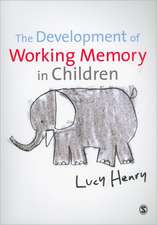The Art of Forgetting
Autor Ivan Izquierdoen Limba Engleză Paperback – 26 mar 2015
Preț: 356.67 lei
Preț vechi: 375.45 lei
-5% Nou
Puncte Express: 535
Preț estimativ în valută:
68.25€ • 71.44$ • 56.80£
68.25€ • 71.44$ • 56.80£
Carte tipărită la comandă
Livrare economică 31 martie-14 aprilie
Preluare comenzi: 021 569.72.76
Specificații
ISBN-13: 9783319067155
ISBN-10: 331906715X
Pagini: 125
Ilustrații: X, 64 p. 4 illus.
Dimensiuni: 155 x 235 x 7 mm
Greutate: 0.12 kg
Ediția:2015
Editura: Springer International Publishing
Colecția Springer
Locul publicării:Cham, Switzerland
ISBN-10: 331906715X
Pagini: 125
Ilustrații: X, 64 p. 4 illus.
Dimensiuni: 155 x 235 x 7 mm
Greutate: 0.12 kg
Ediția:2015
Editura: Springer International Publishing
Colecția Springer
Locul publicării:Cham, Switzerland
Public țintă
GraduateCuprins
1 Introduction.- 2. The art of forgetting2.1 The formation and retrieval of memories2.2 Forms of forgetting; first steps of the art. Extinction, repression, discrimination2.3 Conditioned reflexes2.4 The rapid forgetting of working memory is intrinsic to its nature2.5 Brain areas and systems involved in the different types of memory; some basic notions of neuronal function2.6 Executive functions2.7 More on the connections between nerve cells2.8 The forgetting of short- and long-term memory2.9 Memory and emotions2.10 More on memory and emotions: endogenous state dependency2.11 The use and disuse of synapses2.12 Failure of memory persistence as a form of forgetting?2.13 Reconsolidation2.14 Practicing memory2.15Reading, knowledge, physical exercise, social life, memory and illness2.16 The art of forgetting: a second approach2.17 Denial and memory falsification2.18 Forgetting by large populations2.19 Surviving through neuronal death2.20 The famous case of patient H.M.2.21 When forgetting is not an art: amnesic patients2.22 Anterograde amnesia by an interference with consolidation2.23 Neuronal branching and the suppression of branching, neurogenesis and neuronal death as adaptive phenomena2.24 The acquisition of new memories2.25 Repression2.26 A therapeutic use of the art of forgetting2.27 Accessory memory devices: an adjunct to the art of remembering and to the art of forgetting.- 3. Summing up3.1 Final comments.
Notă biografică
Iván Izquierdo is a physician, professor and neuroscientist. Born in Argentina, but naturalized Brazilian, he lives in Porto Alegre for almost 30 years. He taught and lectured in several institutions, among them the University of Buenos Aires, the Universidade Federal do Rio Grande do Sul – where he helped to create the post-graduation program in Biochemistry – and the Pontifícia Universidade de Porto Alegre – where he is director of the Memory Center, at the Brain Institute. Members of several academies and scientific societies in Brazil and around the world, he have received more than fifty awards, both nationally and internationally and published more than 500 articles in his carrier. He is one of the most respectable specialists on memory physiology worldwide and have discovered the main molecular mechanisms for creation, evocation, persistence and extinction of memory. Izquierdo outstands as one of the most cited Brazilian scientists in any field of research.
Caracteristici
A book especially devoted to forgetting, one of the most important features of memory Forgetting is discussed in all of its possible presentations, including extinction, repression, habituation and falsification Forgetting both as an inconvenient consequence of aging and as an important adaptive feature A guide through the biology of forgetting for students and professionals on psychiatry, psychology and neuropsychology












